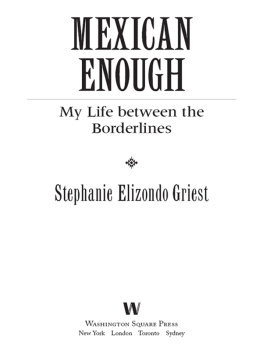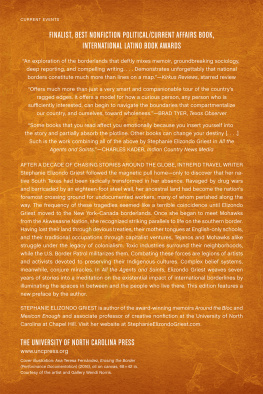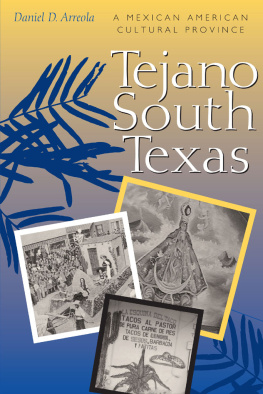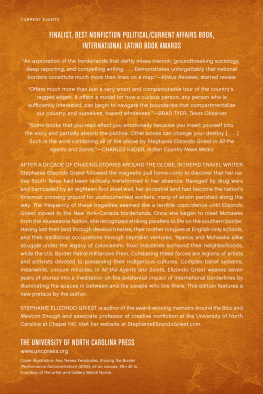Also by Stephanie Elizondo Griest
Around the Bloc: My Life in Moscow, Beijing, and Havana
100 Places Every Woman Should Go

Washington Square Press
A Division of Simon & Schuster, Inc.
1230 Avenue of the Americas
New York, NY 10020
Copyright 2008 by Stephanie Elizondo Griest
All rights reserved, including the right to reproduce this book or portions thereof in any form whatsoever. For information address Washington Square Press Subsidiary Rights Department,
1230 Avenue of the Americas, New York, NY 10020
Portions of chapter 1 originally appeared as Borderlines in Bookmark Now: Writing in Unreaderly Times, edited by Kevin Smokler (Basic Books, 2005), and in Around the Bloc: My Life in Moscow, Beijing, and Havana, by Stephanie Elizondo Griest (Villard, 2004).
Portions of chapter 9 originally appeared in Around the Bloc: My Life in Moscow, Beijing, and Havana, by Stephanie Elizondo Griest (Villard, 2004).
Chapter 11, The Ambassador, was published as La Mentirosa: The Liar, in issue no. 4 of The Los Angeles Review.
Material appearing on Chapter Twenty is from Borderlands/La Frontera: The New Mestiza 1987, 1999 by Gloria Anzalda, and reprinted by permission of Aunt Lute Books.
Washington Square Press and colophon are registered trademarks of Simon & Schuster, Inc.
Library of Congress Cataloguing-in-Publication Data
Griest, Stephanie Elizondo, 1974
Mexican enough : my life between the borderlines / Stephanie Elizondo Griest.
p. cm.
Includes bibliographical references.
1. Griest, Stephanie Elizondo, 1974 2. JournalistsUnited StatesBiography. 3. Mexican American journalistsBiography. I. Title.
PN4874.G747A3 2008
070.92dc22
[B]
2008017394
ISBN-13: 978-1-4165-7971-7
ISBN-10: 1-4165-7971-0
Visit us on the World Wide Web:
http://www.SimonSays.com
FOR MY SISTER AND BROTHER,
BARBARA AND ALEX,
CON TODO MI CARIO
CONTENTS
Se llevaron nuestros frutos, cortaron nuestras ramas, quemaron nuestro tronco, pero no pudieron arrancar nuestras races.
They stole our fruit, they cut off our branches, they burned down our trunk, but they could not unearth our roots.
Popol Vuh
AUTHORS NOTE
I ventured to Mexico in 2005 with two intentions: to learn Spanish and to gain a deeper sense of my cultural heritage. History had other plans, and I found myself documenting a burgeoning social movement that shook parts of the nation to the core. At no point in these travels did I officially work as a journalist for a news agency. The stories that follow are largely unverified, cultivated over conversations and interviews conducted in Spanish, a language I came to speak fluidly but not fluently. I deeply regret any contextual errors or facts missed in translation. Literary license has been taken with the timing and chronology of certain events. For narratives sake, some stories that developed over weeks are relayed as having occurred in a single afternoon.
Terminology is tricky. Everyone from South, Central, and North America is an American, butfor lack of a better alternativeI occasionally use the term to describe people from the United States. Apologies! When referencing U.S. citizens of Latin American ancestry, I use the word Latino. Mestizo refers to Mexicans of both Spanish and indigenous ancestry; indigenous to those descending directly from the ancients: the Mayans, the Zapotecs, and so on.
As for the remarkable people you are about to meet, I refer to most by their first name only to protect their privacy andin some instancesto ward off possible reprisals. I have changed the names of a few parties, as per their request. A heartfelt thanks goes to these heroines and heroes for welcoming me into their lives and entrusting me with their stories. I hope that Ive portrayed them justly.
Drop me a line via my website, www.mexicanenough.com. Im happy to do call-ins for book clubs and classrooms. Gracias!
MEXICAN ENOUGH
Arizona/Mexico Border and Brooklyn,
April 26June 6, 2004
O nce, when I was six, I leaped in front of a moving car. My lip split halfway to my ear. As a doctor stitched my cheek, I decided that motor vehicles were death machines and should be avoided. This is why I live in New York City: subways. On the rare occasion I find myself in the drivers seat, Im haunted by visions of children darting across the roadperhaps images of my former self. I grip the steering wheel at eleven and one oclock, lurching and braking.
Like now. Im sputtering down Interstate 10 in a 92 Mazda, en route from Los Angeles to my parents house in Corpus Christi, Texas. Today is the TucsonEl Paso leg. I veer off the highway onto an isolated farm road curving along the Mexican border and wind up in a desert choked with cactus and brush. This is my ideal driving scenario: no one to hit. The air conditioner has perished, so it is hot as blazes. I roll down the windows and contemplate my thirtieth birthday, which is a month away. My twenties were consumed by my first book, a memoir about traveling around the Communist Bloc. During the decade it took to research, write, and publish it, I grew keenly aware that I was living backward, more in my past than in my present. It is time to move on, but where? To what?
When asked this on my book tour, I had a ready reply: learn Spanish. Despite being third-generation Mexican-American (on my mothers side) and growing up 150 miles from the Texas-Mexico border, my Spanish is best described as Tarzan Lite: a primitive vocabulary spoken entirely in the present tense. My mom faced so much ridicule for her accent growing up that she never taught my sister or me how to speak the language properly. I mostly picked up curse words in school (pendejo!) and opted to learn Russian in college. Studies show that only 17 percent of third-generation Mexicans can speak Spanish fluently, but it riddles me with guiltespecially now that Ive entered the publishing world. Im turning down invitations to speak to groups I supposedly represent because I literally cant communicate with them.
A logical life plan would be to venture across this desert and explore the land and tongue of my ancestors. Yet the very notion terrifies me. Ask any South Texan. To us, Mexico means kidnappings and shoot-outs in broad daylight in Nuevo Laredo, or the unsolved murders of young women in Jurez. It means narco-traffickers in every cantina and explosive diarrhea from every comedor. When I was in high school, a college student got snatched off the street while partying in Matamoros during spring break. Bound and gagged, he was driven to a ranch run by a satanic cult. Next thing you know, he was menudo. One worshipper wore a belt made of his victims spinal cords.
So go to Mexico? Thanks, but Id rather return to Moscow and track down my old mafiosi boyfriend.
Im cresting a small hill now. Glistening pools of water appear on the road up ahead, then evaporate. It is dizzyingly hot. I glance down at the gas gauge. Its nearly empty. Cell phone: roaming. Not a soul has passed me on this road. If the Mazda breaks down, Im toast. Better turn around and rejoin the main highway. My foot hovers above the brake as I grasp the clutch.
Something appears in the distance. Objects in the middle of the road. Moving sluggishly, then quickly. Bears? What kind of bear prowls around the Arizona desert? No. They must be wild dogs, big ones, standing on their hind legs andrunning?
No. They are people. One figure seems to be a child. My lifelong phantom has actualized. I slam the brakes. They must be Mexicans fleeing the border. I blare the horn.






